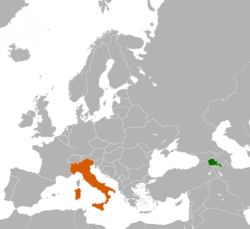Armenia–Italy relations
 | |
Armenia |
Italy |
|---|---|
Bilateral relations exist between Italy and Armenia. Italy has an embassy in Yerevan and Armenia has an embassy in Rome.
History
Armenia and Italy have a long standing relationship since antiquity, when the Etruscan civilization sought to trade with the Armenians in the Kingdom of Urartu.[1] This was later expanded when the Roman Empire began to expand and managed to conquer Armenia, converting it into a province.[2] While the Armenians sought to fight and survive from Roman domination, cultural exchanges between two increased and further strengthened by commonalities, eventually enriched the rich relationship between Rome and Armenia.[3]
Both Armenia and Italy went on to be Christian nations, and carry significant distinction that make their relationship unique. Armenia was the first Christian nation on earth, while Italy is the home of Holy See, the holiest place of Christianity after Jerusalem.[4][5] Therefore, relations between Armenia and Italy have been tied by the ancient links and Christian connection to even today.
Armenian genocide
The Kingdom of Italy joined the World War I in 1915 and was one of the first nations to condemn the Armenian genocide by the Ottoman Empire. Italian consul Giacomo Gorrini had openly denounced the atrocities by the Ottomans.[6] Due to his effort to prevent the genocide and his later support for Armenian struggle, he was honored in Armenia.[7]
Genetic connection
In 2014, a study research indicated that Armenians shared a quarter of genetic connection with Italians.[8][dubious ]
Today
Immediately after the collapse of Soviet Union, Italy was one of the earliest nations to recognize the independence of Armenia. When the First Nagorno-Karabakh War broke out, Italy is notable for being the first chairman of OSCE Minsk Group's acting for the peaceful settlement of the Nagorno-Karabakh conflict.[9] President Carlo Azeglio Ciampi, in 2005, reminded that the attempts of the Minsk Group of OSCE had not produced any results yet and stated that he would do his best to strengthen the activity of the Minsk Group.[10]
Italy, in 2000, recognized the Armenian genocide and openly punished those who deny such atrocities.[11][12][13][14] It was further reinforced in 2019, when the Italian Chamber of Deputies adopted an initiative calling on the Italian government to recognize the Armenian genocide and give the issue an international dimension.[15]
Trades
Armenia's trade turnover with Italy has been on a steady rise. In 2018 comprised 232.48 million USD, which increased by 15.5% compared to 2017 (201.3 million USD); the export from Armenia to Italy comprised 49.88 million USD, the increase was 15.2% compared to 2017 (43.28 million USD), the import from Italy to Armenia, by country of origin, comprised 182.6 million USD, the increase was 15.6% against 2017 (158.0 million USD).[16]
Recognition of Artsakh
In 16 October 2020, the city of Milan became the first place in Italy to recognize the Republic of Artsakh, an Armenian separatist nation homeland within internationally recognized Azerbaijani territory.[17] The city of Cerchiara in Calabria later followed in 28 October.[18]
Italy, on the other hand, has not recognized Karabakh and instead urged to solve the conflict peacefully.[19]
Diplomacy
See also
References
- ^ https://scholarworks.umass.edu/cgi/viewcontent.cgi?article=1003&context=etruscan_studies
- ^ https://digitalcommons.lsu.edu/cgi/viewcontent.cgi?article=1831&context=gradschool_theses
- ^ Boyajian, Michael (23 May 2019). Roman Armenia: A Study in Survival Second Edition. ISBN 978-1099829383.
- ^ https://www.nwfdailynews.com/news/20180317/armenia-first-christian-nation
- ^ https://tannerlectures.utah.edu/_documents/a-to-z/b/Brown95.pdf
- ^ https://genocidediary.org/portfolio/turks-slaughtered-14000-armenians-drowned-by-wholesale-in-black-sea/
- ^ https://en.gariwo.net/righteous/the-righteous-biographies/metz-yeghern/people-recognized-as-righteous/giacomo-gorrini-7518.html
- ^ https://armenpress.am/eng/news/750256/study-armenians-have-genetic-links-to-italians-and-chinese.html
- ^ https://www.mfa.am/en/international-organisations/4
- ^ https://www.osce.org/minsk-group/108306
- ^ Pascal, Julia (January 26, 2001). "A people killed twice". The Guardian.
- ^ "Italy Senate moves to outlaw Holocaust denial". Local.it. February 11, 2015.
- ^ "Italy Senate moves to outlaw Holocaust and genocides denial". Armenpress. February 12, 2015.
- ^ "Arminfo: Senate of Italy adopts a bill criminalizing denial of Holocaust and other genocides". Arminfo.am. Retrieved April 23, 2015.
- ^ "Italian Chamber of Deputies calls on government to recognize Armenian Genocide". News.am.
- ^ https://armenpress.am/eng/news/995802.html
- ^ "Italy's Milan recognizes Artsakh's independence".
- ^ "Italy's Circchiara of Calabria recognizes Artsakh independence".
- ^ "Italy backs 'negotiated solution' over Upper Karabakh".

